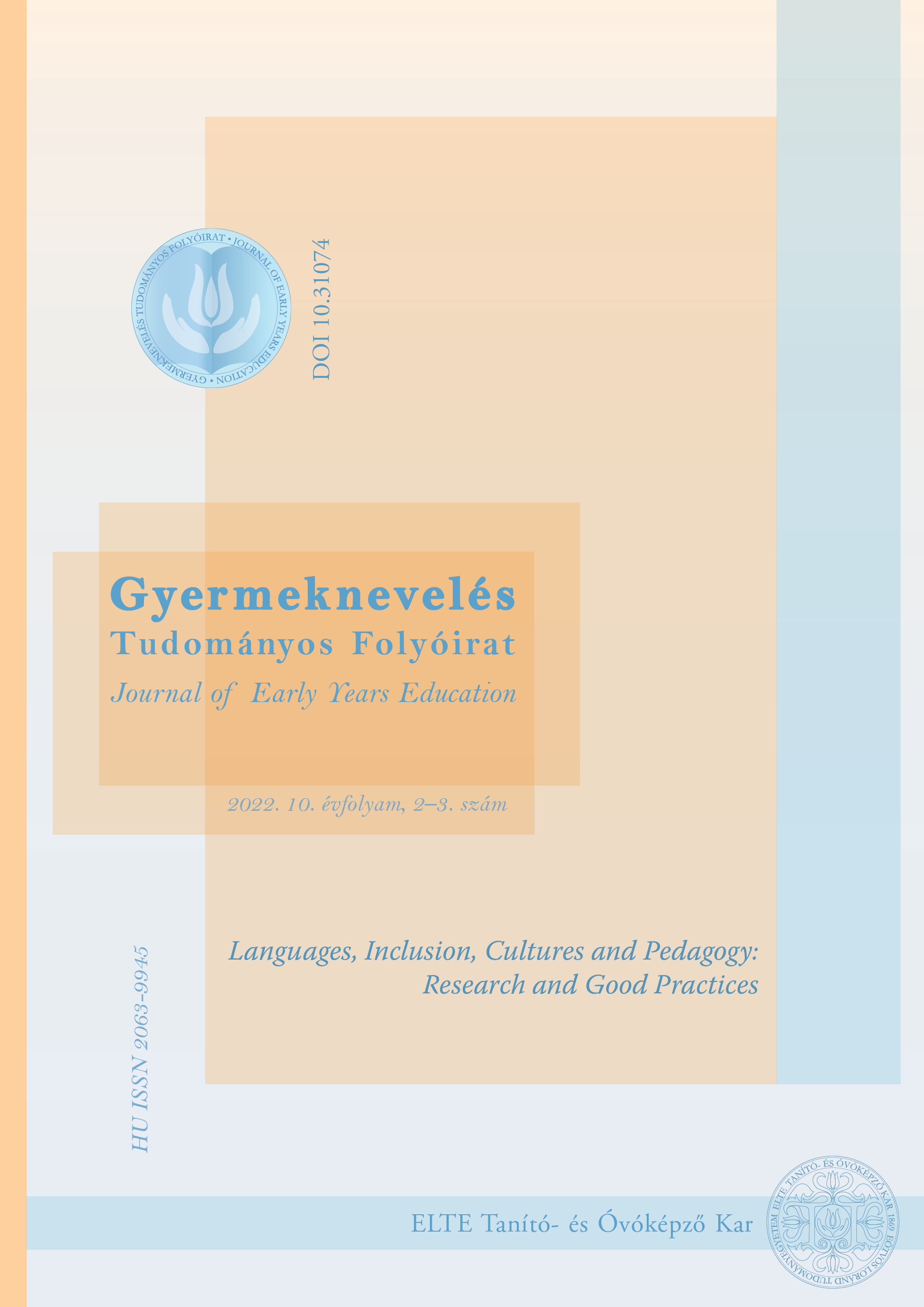Opportunities for recognising, assessing, and providing online support among elementary school students with dyscalculia
Options for recognising, surveying, and online support for dyscalculia in primary school students
DOI:
https://doi.org/10.31074/gyntf.2022.3.205.219Keywords:
ability components, diagnostic system, dyscalculia, developmentAbstract
Mathematics is present throughout our lives. Already in infancy, children become acquainted with quantities and the differentiation of quantities (Starkey & Cooper, 1995; Huntley et al., 2000; Csépe et al., 2007, 2008). According to von Aster and Shalev (2007), the quantitative core system (cardinality) develops in infancy. An infant is capable of subitising, estimating, and comparing the quantities of a small number of items. After learning from their environment in early childhood, children perceive quantities and then understand the strategy needed for counting and are able to count verbally. They use different classifications to determine the quantities. Kindergarten prepares the knowledge needed for the application of the concept of numbers and lays the foundations for the concept of operations. As a continuation of knowledge acquisition of knowledge, in primary school the establishment of a unified and broad foundation takes place with a focus on the development and consolidation of the concept of numbers and operations. Number words representing quantities are associated with digits, therefore school children express them with symbols without the presence of quantities (von Aster & Shalev, 2007; Jármi, 2013, p. 50). This developmental process allows for the learning of written operation performance in the lower grades, while the internal number line (analogous quantity representation) develops in the child, which strengthens spatial thinking. In the initial stage of the lower school grades, active knowledge acquisition dominates, which is the first level of abstraction of mathematical activities. In the grades that follow, the constantly and spirally repeating, expanding nature of knowledge strengthens the fourth level of abstraction, i.e., the independent application of symbols.
Downloads
References
Csépe, V., Győri, M. & Ragó, Anett (2007–2008). Általános pszichológia 1-3. – 3. Nyelv, tudat, gondolkodás. Digitális Tankönyvtár. Oktatási Hivatal. https://regi.tankonyvtar.hu/hu/tartalom/tamop425/2011_0001_520_altalanos_pszichologia_3/ch17.html#id548161
Csonkáné Polgárdi, V. & Dékány, J. (2013). A Diszkalkulia Pedagógiai Vizsgálata (DPV). Gyógypedagógiai Szemle, 41(2), 118–136. https://epa.oszk.hu/03000/03047/00060/pdf/EPA03047_gyosze_2013_2_118-136.pdf
Dékány, J. (2009). Tanulási sikertelenség és matematikai kompetencia. Gyógypedagógiai Szemle, ^ 37(5), http://epa.oszk.hu/03000/03047/00047/pdf/EPA03047_gyosze_2009_5_356-361.pdf
Farkasné Gönczi, R. (2019). Számolási zavarok, diszkalkulia. In Mesterházi, Zs. & Szekeres, Á. (Eds.), A nehezen tanuló gyermekek iskolai nevelése (pp. 84–88). ELTE BGGYK.
Farkasné Gönczi, R. (2018). A diszkalkulia diagnosztikája eltérő szaktudományi aspektusokból. Doktori disszertáció. Eötvös Loránd Tudományegyetem, Neveléstudományi Doktori Iskola. http://www.dyscalculiaport.gonczirita.hu/wp-content/uploads/2016/11/Farkasne_Gonczi_Rita-A_diszkalkulia_diagnosztikaja_eltero_szaktudomanyi_aspektusokbol_doktori_disszertacio.pdf
Farkasné Gönczi, R. (2017). Diagnosis of dyscalculia from different faculty aspects and from a practice point of view. In Koncz, I. & Szova, I. (Eds.), Társadalmi problémaérzékenység, szakmai megoldáskeresés (pp. 193–200). PEME XV. PhD – Konferenciakötet. Elektronikus kötet I. rész. Professzorok az Európai Magyarországért Egyesülete.
Farkasné Gönczi, R. (2014). A számolási zavarok területére kidolgozott számítógép alapú mesébe ágyazott diagnosztikus eszköz fejlesztésének bemutatása. In Nagyházi, B. (Eds.), Innováció a neveléstudomány elméleti és gyakorlati műhelyeiben (pp. 20–28.). Kaposvári Egyetem 7. Képzés és Gyakorlat című konferencia tanulmánykötete. Kaposvári Egyetem.
Farkasné Gönczi, R. (2011). A diszkalkulia fogalma a neurológia, a pszichológia és a pedagógia aspektusából. In (n.a.) Tudomány – Felsőfokon. Válogatás kiváló diplomamunkákból, szakdolgozatokból (pp. 6–59). Új Tudós Kiadó.
Farkasné Gönczi, R. (2008). Diszkalkulia a gyógypedagógia és határtudományai aspektusából. Gyógypedagógiai Szemle, 36(3), 204–214. https://epa.oszk.hu/03000/03047/00042/pdf/EPA03047_gyosze_2008_3_204-214.pdf
Fábián, M., Lajos, J., Olasz, T. & Vidákovich, T. (2008). Matematikai kompetenciaterület, szakmai koncepció. Educatio Kht., https://goo.gl/by3tA8 Jármi, É.(2013). Alapvető számolási képességek tipikus és atipikus fejlődése – a számolási zavar diagnosztikája. PhD-értekezés. Eötvös Loránd Tudományegyetem, Pedagógiai-Pszichológiai Kar, Pszichológiai Doktori Iskola.https://ppk.elte.hu/file/jarmi_eva_disszertacio.pdf]()
Kaufmann, L. & von Aster, M. (2012). The Diagnosis and Management of Dyscalculia. Deutsches ärzteblatt International. 109(45), 767–778. https://doi.org/10.3238/arztebl.2012.0767
Krajcsi, A. (2010). A numerikus képességek zavarai és diagnózisuk. Gyógypedagógiai Szemle, 38(2), 93–113. http://epa.oszk.hu/03000/03047/00049/pdf/EPA03047_gyosze_2010_2_093-113.pdf
Mesterházi, Zs. (2004). A gyógypedagógiai folyamatokról. In Gordosné Szabó, A. (Ed.), Gyógyító pedagógia – Nevelés és terápia (pp. 19–40). Medicina Könyvkiadó Rt..
Polgárdi, V. (2015). A Diszkalkulia Pedagógiai Vizsgálata (DPV) – (A Dékány – Juhász féle diszkalkulia pedagógiai vizsgálat sztenderdizált változata) – Ismertető a Diszkalkulia Pedagógiai Vizsgálatáról óvodás- és kisiskolás korú gyermekeknél (3. rész). Gyógypedagógiai Szemle, ^43(1), 35–48. http://epa.oszk.hu/03000/03047/00067/pdf/EPA03047_gyosze_2015_1_035-048.pdf
Schlegel, H. (2007). Dynamische Entwicklung von Rechenstörungen. In Ganser, B. (Ed.), Rechenstörungen, Hilfe für Kinder mit besonderen Schwierigkeiten beim Erlernen der Mathematik (pp. 26-31). Auer Verlag.
Starkey, P. & Cooper, R. G. (1995). The development of subitizing in young children. British Journal of Developmental Psychology, 13(4), 399. https://doi.org/10.1111/j.2044-835X.1995.tb00688.x
von Aster, M. & Shalev, R. (2007). Number development and developmental dyscalculia. Developmental Medicine and Child Neurology, 49(11), 868–873. https://doi.org/10.1111/j.1469-8749.2007.00868.x
Additional Files
Published
How to Cite
Issue
Section
License
Copyright (c) 2022 Author

This work is licensed under a Creative Commons Attribution-NonCommercial-ShareAlike 4.0 International License.

